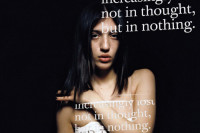
Not everyone has a novel in them
thecritic.co.uk – Friday March 22, 2024

Mrs Secret Author, who knows her onions, recently drew her husband’s attention to a Facebook post that, or so she claimed, simultaneously epitomised all that was best and all that was worst about the modern literary marketplace.
In it a woman — thankfully unknown to us — had decided to file her new year’s resolutions. One of them was to write “a Romance novel”. Clearly this was going to take a bit of time, but the aspiring novelist was confident that if she started now it would be possible to plan for a pre-Christmas launch.
All this, it turned out, had gone down a storm with the poster’s friends. To a man — well, actually to a woman — they rushed to assure her what a terrific idea it was. Several of them confided that they, too, had always wanted to write “Romance novels” and it was great that at least one of their number was about to get on with it.
And who was lined up to publish the darling work? Naturally, in this age of limitless technological horizons and level playing fields, the author was going to publish it herself.

Heavy Traffic is a radical new take on the literary magazine
dazeddigital.com – Tuesday March 19, 2024

There are no images. Instead, the cover star of New York magazine Heavy Traffic is a barrage of text gleaming against a black void, the words chopped up and winding around its edges. “She no longer had the language to describe what was happening,” it reads. “She murmured loudly to herself now, becoming increasingly lost not in thought, but in nothing.”
The literary magazine’s language, described by editor Patrick McGraw as “gibberish”, becomes increasingly haphazard and deranged as the pages turn (“Hard limit. Scarr-ed. sssh. whoAMiTALKingTO”). It almost feels like an IRL version of the infinite scroll, the words cascading through our brains like they do when flicking between feeds, tabs or messaging apps. We are a population that is becoming “increasingly illiterate”, McGraw writes in his editor’s letter. The new issue’s central occupation – not that the magazine officially has any themes – is to explore how language today has become detached from any meaning, beyond comprehension. “The more people see,” he writes, “the less they read.”

How to sustain a writers’ group
scottishbooktrust.com – Wednesday March 13, 2024

Games and fiction writer Gavin Inglis shares his top tips for running a writers' group that lasts.
Gavin Inglis has been in the same writers’ workshop since 1993. He shares some of the secrets that have helped keep it together all these years.
Make sure your writers' group has a focus
For a start, your group needs an identity so potential members can decide whether or not it suits them. Perhaps it is a friendly, open gathering dedicated to encouragement and support. Perhaps it is a private workshop which critiques commercial crime novels. It can be whatever works for the membership, but if it tries to be all things to all people, it will not have the cohesive force to endure.
People stick with writers’ groups because they are useful, and/or members enjoy the experience. Support, critique, networking. . . Understand what it is you do well, and move that to centre stage.

Lisa Gardner: 10 Lessons I Learned in 30 Years of Suspense Writing
crimereads.com – Wednesday March 13, 2024

When people first meet authors, they always ask the same question—how did you get started in this business? I’m a bit a rarity. Wrote my first novel at seventeen, sold it at twenty, hit the bestseller lists at twenty-eight. Trust me, if you’d told my 12-year old bookworm self, armed with a library pass and overactive imagination, that this would be my life, I never would’ve believed it. And yet, a sometimes heartbreaking, always incredible three decades later, here I am. Better yet, here’s what I’ve learned along the way.
1. Write from the Heart
Needless to say, I’ve sat through a lot of advice on trends over the years. Write whatever you want to write…but make it about vampires. Wait, domestic suspense is in…or is it international thrillers…unreliable narrators…books with the word girl/she/her in the title? These fads are all true and yet none of them matter. As writers, we think in story. Good news, so do readers. What is the best thing you can possibly be writing right now? The book that keeps knocking at your mental door. At seventeen, I had this scene I couldn’t get out of my head—a woman who ran a shelter for homeless youths, witnessing a murder one night, and the killer spotting her. Maybe other people dream of rainbows and fluffy bunnies, but clearly they were never meant for crime fiction.

On writing settings that crawl under the skin
crimereads.com – Thursday March 7, 2024

I once attended a writing seminar that claimed the landscape of your childhood home informs the way you move, think, and talk. A rocky, mountainous place might shorten your sentences into a rhythm that makes room for quick bursts of speed; a hot and humid landscape might lead you to consider your thoughts slowly, without straining yourself.
Embarrassingly, I have forgotten exactly who led this discussion (if you’ve attended something similar, please tell me!), but the idea has never left me—that, in the same way some people wind up looking exactly like their dogs, the place where you live can infect you to a deeper degree than you might have realized.
It’s by turns a comforting notion, and a disturbing one. What might you be carrying with you, subconsciously influencing your choices? And what if your relationship to those childhood landscapes isn’t altogether positive? I think of my grandmother, who, when asked about this concept at a dinner not long after, visibly recoiled from the question. Her early memories of Mississippi river flats and anything that land might have imprinted on her were not welcome at our table. She spent much of her life traveling, finally landing in New York, and only conceded to move as far south as Virginia because my brothers and I were children there.

Secret agents
thebookseller.com – Monday February 26, 2024

Literary agents are central to authors’ success — so why are we still considered a fringe benefit?
Recently I filmed an online course on "How to Get a Literary Agent" for our in-house creative writing school, Curtis Brown Creative. It was an enjoyable pause in my frenetic activities as a literary agent and c.e.o. of Curtis Brown Group to stop and reflect on the changing role of the literary agent during my 30 years at CB. Unsurprisingly, I concluded we agents are an essential part of the publishing process. Yet, why are literary agents considered so outside the system?
I say this because the first question I always ask to every new intern and assistant at CBG who has come off a MA in Publishing course is: “what did you learn about the role of the literary agent?”
The answer is always the same: “Oh, there was no mention of agents in the course but sometimes we get a session from a visiting agent."

Richard Charkin: Unintended Consequences in Publishing
publishingperspectives.com – Saturday February 24, 2024

Unintended Consequences in Publishing support Charkin’s Law: everything that can go wrong will go wrong.
HarperCollins’ announcement of a big increase in digital sales—largely downloadable audio and materially generated by the partnership with Spotify—made me contemplate the balance between decisions made with the best will in the world and their not-always-beneficial consequences.
I don’t know enough (I couldn’t know) about this particular deal, but is the offer of 15 hours a month of free audiobooks to Spotify customers a longer-term benefit to sales? What proportion of audiobook listeners actually listen to more than 15 hours a month? There will be some, of course, and Spotify might indeed increase the numbers of the hard-core audience but what happens to the rest?
With the benefit of an exceptionally helpful rear-view mirror, let’s think about other similar decisions.

Hold That Train! Writing a Sliding-Doors Thriller
crimereads.com – Thursday February 15, 2024

I first saw Sliding Doors on VHS in 1999, the year after it released in theaters. I was eighteen and seeking my way back from my first real heartbreak. Mere days after an amicable split with my boyfriend, a slow drifting apart that was more bittersweet than painfully acute, he had called me up to say he was seeing someone new—my best friend. Then the pain rushed in. I slid the tape into my VCR expecting the kind of romantic comedy that would feel bad and good at the same time, like pressing on a bruise. (As it turned out, Sliding Doors was not a typical rom-com, something I’ll return to in a moment.) But it did resonate in unexpected ways.
In the opening sequence of the dual-timeline film, Gwyneth Paltrow’s character Helen gets fired from her job, and in one reality, catches the train and comes home to find her boyfriend in bed with another woman. Helen’s experience didn’t precisely mirror my own, but heartbreak has a way of shimmying from a TV screen or leeching from the pages of a novel, finding its way into your soft spots. (In the other reality, Helen misses the train and her boyfriend’s mistress has left by the time she makes it home, a sequence of events that only seems to launch her down a brighter path.)

Why a Writing Ritual Is the Ultimate Creativity Boost—How to Design One for Yourself
camillestyles.com – Monday February 5, 2024

I've long believed: a happy, healthy life is built on rituals. From your morning routine to your evening wind-down, our days flow with greater ease when we have supportive habits in place. Decision fatigue is an inevitable truth of our lives (the internet presents us with no shortage of rabbit holes). But rituals allow us to weave more intention into our choices. By committing to what helps us feel our best, we benefit from a level of self-trust that becomes a fixture of our days. And as a writer, that truth shows itself most in my daily writing rituals.
I’m both blessed and cursed with a creative career. Writing, of course, is a skill you develop through education, experience, and exposure to beautiful words and effective style. But it also requires inspiration—a central point from which we can build a story, argument, or even a single thought. And honestly? Some days, I don’t have it. Writing rituals, however, help me conquer the blank page with confidence.

You're Asking Too Much From Your Story And Not Enough From Yourself
nofilmschool.com – Tuesday January 30, 2024

The only way to get vulnerability and truth into your story is to share parts of yourself.
Last year, I was staring at a blinking cursor on my screen and at a crossroads. I had written a screenplay with a great plot, but the feedback I kept getting was that it didn't have a soul.
I distinctly remember a friend asking me, "What makes this a Jason Hellerman script?"
At the time, I answered, "Because my name is on it."
It was a clever retort, but I was wrong.
Sure, it was on the title page, but the issue I was having was that I was not putting enough of myself into the writing. I thought the plot and the characters would compensate for it. But because I was not imbuing the page with a piece of me, it still felt hollow.
That can only get you so far.
And it wasn't going to get my movie made.
Get the free newsletter | Submit a news item or article | Get Writers' News for your website





